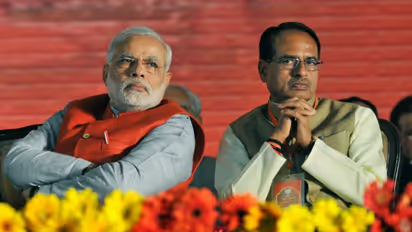
Bhopal: The Congress with 116 of the 230 Assembly seats in its kitty compared to the BJP's 107 will - after an abnormally long delay in counting - form the government in Madhya Pradesh in what turned out to be the closest fought election in the history of the state. In fact, MPCC president and the party's chief ministerial probable Kamal Nath shot off a letter to Governor Anandiben Patel to stake his claim even as the excruciatingly extended counting of votes was still on. The governor conveyed that the formalities of government formation would commence only after the Election Commission had notified the poll.
Not the one to be browbeaten, Kamal Nath later convened a presser in the small hours of Wednesday morning (around 2:45 am) that the Congress had crossed the half-way mark and would not need the support of independents or any other party. This, even as the results of a few seats had still to be formally declared. So barring an unforeseen caper, the newly elected legislators of the grand old party should have no problem parking themselves in the treasury benches.
Given the razor-thin margins of victory (less than 500 in 10 seats) one thing is certain: the ruling BJP would almost certainly have romped home, anti-incumbency notwithstanding, had it dropped at least 80-85 of its sitting MLAs against the 43 it actually did. The likely consequences of its failure to cast out the deadwood were mentioned in the columns of MyNation in the report dated November 12. Public anger against the ruling party's non-performing MLAs had manifested itself from the very beginning of the campaign. The BJP's adamant refusal to respect popular opinion took a toll.
Also read: BJP’s 7 reasons for hope despite doomed state election results
To that extent blame for the BJP's ouster from power after 15 years’ rests squarely on the shoulders of the outgoing chief minister Shivraj Singh Chouhan. Ticket distribution was largely left to him, and he in turn reportedly farmed out the responsibility to his loyalists: Union minister Narendra Singh Tomar for the Gwalior-Chambal region and state party president Rakesh Singh for the Jabalpur/Mahakaushal belt. The BJP suffered heavy reverses in both regions. Quite clearly the fear of revolt trumped cold reason during the nomination process.
Chouhan may also have overestimated the power of his own popularity to beat anti-incumbency. Truth to tell, the BJP could have decisively lost, had the Modi factor not kicked in. Like in Gujarat, the public rallies addressed by the Prime Minister pushed up the party's tally. Many opted to vote BJP to prevent weakening Modi rule at the Centre.
Chouhan's own demeanour had begun to show distinct signs of arrogance despite his overall amiability. His threat to hang careless bureaucrats upside down ("ulta taang doonga") was mocked at. Then there was that "Koi maai ka lal nahin.." who could prevent him from implementing the SC-ST Atrocities Act offended many. Thirteen years in power made him believe he was invincible, surrounded as he was by a bunch of fawning advisers, the foremost being a retired promotee officer who doubled up as a family retainer of sorts. Chouhan's decision to give him an unprecedented five-year extension in service caused much heartburn among senior bureaucrats. The open influence of wife Sadhana in transfers and postings was also a factor which earned him considerable opprobrium. Not that it had the slightest effect.
And yet if the 2018 state Assembly poll did not throw up a decisive victor despite the strong gale of anti-incumbency coupled with the refusal to nominate new faces, credit must necessarily go to the ruling party's powerful election machine. The BJP lost but the Congress did not win. Its vote share stood at a rock solid 42%, roughly the same as the latter. The overall slippage was around 4%. A few hundred votes here or there would have told an entire story. There was no burning issue per se.
Also read: PM Modi, Shivraj 'Mama', loyal voters may see BJP through in Madhya Pradesh
The much-touted farmers' distress turned out to be overly exaggerated. Glaring evidence came from the BJP win at Mandsaur, the scene of a vicious Congress sponsored agitation in June 2017 in which six farmers fell to police bullets. What may have cost the BJP a few thousand votes is Rahul Gandhi's irresponsible promise to waive farmer loans up to Rs 2 lakh.
Barring the Vindhya region where it surprisingly swept all 27 seats, the BJP's losses and the Congress's corresponding gains were evenly spread in Malwa, Chambal, Bundelkhand, Mahakaushal etc. Shorn off funds and organisational skills, the Congress ran a ragtag campaign. In the end, it was just the desire for change that ejected the BJP from power. As someone said: "Voters had grown tired of wearing the same shirt for 15 years."